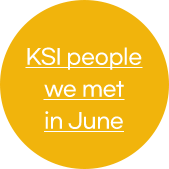
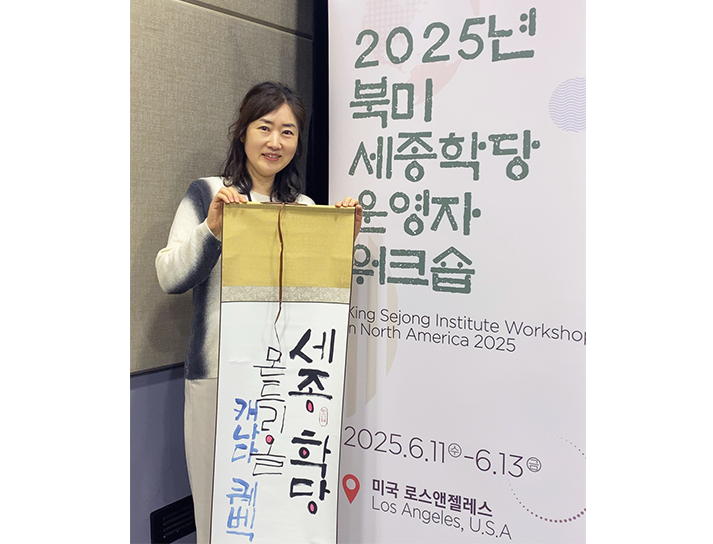
“I want to serve as a bridge
connecting people and cultures.”
A Conversation with Ma Hyun-joo,
Operation Staff and Participant of the
2025 KSI Workshop in North America
Ma Hyun-joo, Operation Staff at KSI Montreal, Canada, has been part of the institute since its early days. From
June 11 to 13, she participated in the 2025 KSI Workshop in North America, reflecting on the ongoing efforts of
KSIs across the region and exploring future directions for growth. We spoke with Ma Hyun-joo about her
impressions of the workshop and her aspirations as an Operation Staff member dedicated to developing KSI
Montreal into a key hub for Korean culture in North America.
Hello, Ma Hyun-joo from the Operations Team! It’s a pleasure to meet you. To begin, could you please briefly
introduce yourself to the readers of Monthly Knock Knock and tell us about the KSI where you currently work?
Hello. My name is Ma Hyun-joo, and I work as part of the Operation Staff at KSI Montreal, Canada. Montreal is a
city located in the province of Quebec in eastern Canada, and it is culturally closer to the French-speaking
world. As a multicultural immigrant society, it offers the charm of experiencing diverse cultures and cuisines.
At the same time, with nearly half the year being winter, it’s a dynamic city where residents are passionate
about everyday sports like ice hockey.
Although the Korean Wave (Hallyu) didn’t spread as rapidly here as it did in the United States or other
English-speaking metropolitan areas, interest in Korea has gradually increased—especially after the global
COVID-19 pandemic, as more people began watching Korean dramas on Netflix. As a result, demand for travel to
Korea has grown, and interest in Korean culture has become more widespread. In the past, most learners at KSI
Montreal, Canada were younger people taking courses as a hobby. Recently, however, learners from a wider range
of age groups have been coming to study Korean language and culture.
How long have you been working as part of the Operation Staff at KSI Montreal, Canada? What led you to take on
this role locally, and how has the experience influenced you?
I obtained my Korean language teaching certification in 2016 and immigrated to Canada the following year, where
I began teaching Korean to local residents. Since 2016, the Sejong Team under the Korean-Quebec Foundation,
which operates KSI Montreal, Canada, has been using Sejong Korean textbooks to teach Korean locally. I initially
worked there as a Korean language teacher, and in June 2019, when KSI Montreal was officially designated as a
new KSI, I began serving as full-time Operation Staff.
Transitioning from teacher to part of the Operation Staff came with its challenges, but the joy of being part of
KSI’s growth far outweighed the difficulties. By applying for and managing various programs offered by the KSIF,
I was also able to collaborate with other organizations such as the Korean Food Promotion Institute and the
Taekwondo Promotion Foundation. These partnerships allowed us to introduce a wide range of Korean cultural
content to the local community and provide our learners with valuable benefits. Seeing how excited and
enthusiastic the learners were throughout these experiences moved me deeply and gave me a strong sense of
fulfillment.
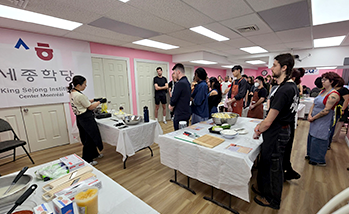 Learners at KSI Montreal, Canada participating in a kimchi-making event
Learners at KSI Montreal, Canada participating in a kimchi-making event
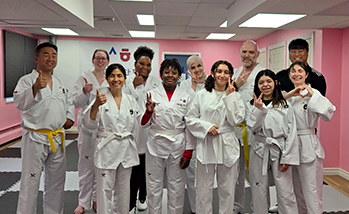 Learners at KSI Montreal, Canada taking part in a taekwondo class
Learners at KSI Montreal, Canada taking part in a taekwondo class
You attended the 2025 KSI Workshop in North America, held from June 11 to 13. Was there a particular moment
during the workshop that stood out to you the most?
This workshop was an opportunity for both “gratitude” and “renewed commitment.” Among the special lectures, I
found the sessions on learner-centered backward design and exploring the global influence of Hallyu content
especially engaging. I plan to share these insights with our teachers at KSI Montreal, Canada through upcoming
meetings and internal seminars.
The presentations on KSI operations and case studies were also highly valuable. Listening to how each KSI in
North America is actively engaging local residents through various cultural programs, events, and hands-on
experiences tailored to their specific regional contexts was truly inspiring and relatable. It was a meaningful
time that allowed me to reflect on our own efforts at KSI Montreal and consider the direction we should pursue
in the future. Among the many programs we applied for this year, I am especially committed to making the most of
the Sejong Culture Academy and the Overseas Cultural Internship Program, with a focus on showcasing the appeal
of Korean culture and building closer connections with our students.
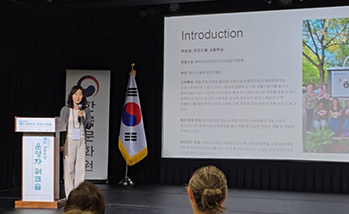 Ma Hyun-joo, Operation Staff, introducing
Ma Hyun-joo, Operation Staff, introducing
KSI Montreal, Canada at the 2025 KSI Workshop
in North America
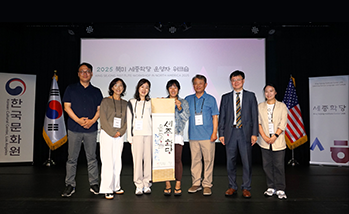 KSI Montreal, Canada representatives participating
KSI Montreal, Canada representatives participating
in the workshop
This year’s workshop included a session on National Subsidy Accounting Procedures for directors and Operation
Staff. Were there any key takeaways or new insights you gained from this training?
The National Subsidy Accounting Procedures session, led by accountant Na Hee-jae, who oversees the North America
region, was extremely helpful for Operation Staff. Although I’ve been handling accounting tasks for over six
years, this training was a valuable opportunity to revisit and clearly organize important information. In
particular, I gained a better understanding of the need to strictly follow KSIF guidelines when executing
payments for expert invitations and travel expenses related to events. Given that we expect to host more
cultural programs in the future, I plan to handle these processes with even greater care moving forward.
This workshop also served as a valuable opportunity for KSI personnel across North America—including
directors, Operation Staff, and teachers—to come together and exchange ideas. Was there anything in particular
that you learned or felt through your interactions with other KSI representatives in the region?
Most of the KSIs participating in this workshop were affiliated with universities, while only two—like KSI
Montreal, Canada—were independently operated by nonprofit foundations. These included KSI Irvine and KSI San
Francisco, both run by Korean community centers.
As a KSI operated by a Korean cultural center, KSI Montreal, Canada carries a strong sense of responsibility to
offer Korean language and culture programs from a broader, more inclusive perspective. For learners such as
adoptees, multicultural families, and second-generation immigrants, the opportunity to study Korean language and
culture can often feel even more urgent and meaningful than for local non-Koreans. Together with the other two
independent KSIs, we discussed the importance of expanding our target audiences and diversifying our programs
from the planning stage. In particular, we received helpful advice from a KSIF representative, who suggested
that special courses under KSIF’s specialization initiatives could be an effective way to reach underserved
communities. This insight was especially meaningful and helpful for our future planning.
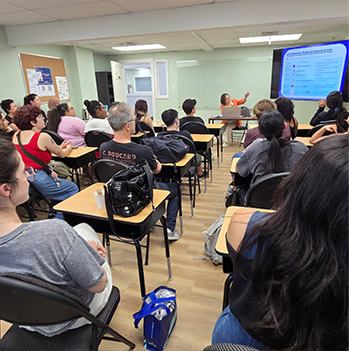 End-of-term ceremony at KSI Montreal,
End-of-term ceremony at KSI Montreal,
Canada in 2025
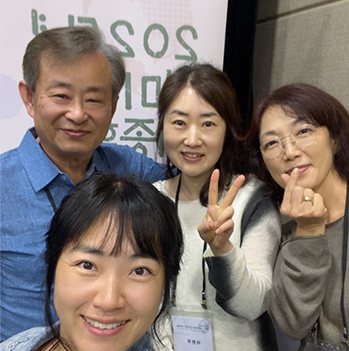 KSI Montreal, Canada representatives
KSI Montreal, Canada representatives
at the 2025 KSI Workshop in North America
Finally, could you share the goals you hope to achieve at KSI Montreal, Canada? We’d also love to hear about
your personal aspirations as part of the Operation Staff.
KSI Montreal, Canada has set a clear mid- to short-term goal of growing into a center for Korean culture in the
North and East American regions, and we are steadily progressing through each stage to reach that goal. We are
expanding the institute’s scale, diversifying special courses in the cultural sector, operating a wide range of
programs supported by KSIF, and strengthening external partnerships. Through these efforts, we are delivering
even more dynamic cultural content to local residents. Thanks to recent investments by the operating
organization, we have relocated to a larger facility and enhanced our cultural experience infrastructure. The
construction of a Korean Culture Experience Center is steadily nearing completion. In a city like Montreal,
where there is no Korean Cultural Center, our KSI has grown beyond being simply a Korean language institute—it
is becoming a trusted and recognized platform for engaging local residents with Korean culture.
As part of the Operation Staff at KSI Montreal, Canada, I aim to actively serve as a cultural ambassador for
Korea both within and outside the institute. As the person responsible for operations, I will follow KSIF’s
guidelines and ensure the institute is run in alignment with the development goals of our operating
organization. Externally, as a member of the Korean community, I want to help our community contribute more to
the broader society, and at the same time, act as a bridge so that when members of the mainstream community turn
their attention to Korean culture, they are met with warm smiles and understanding nods.